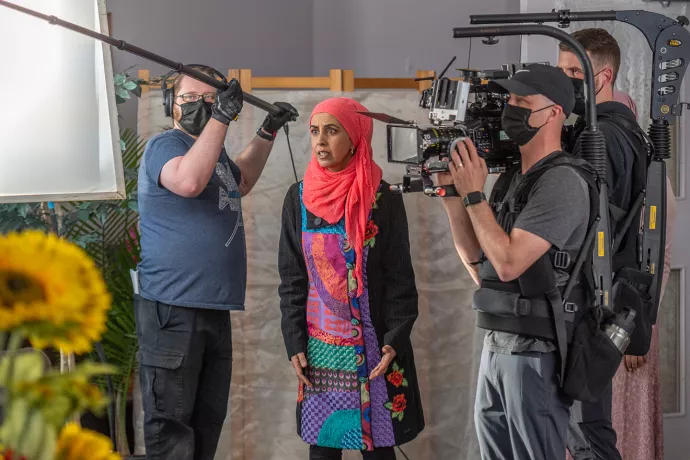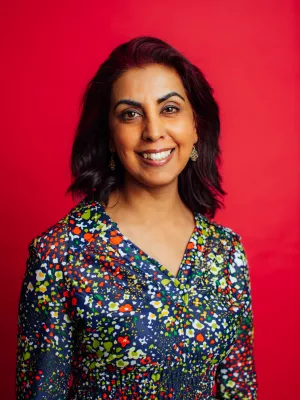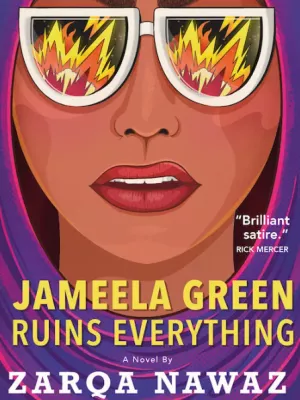
UTM alum Zarqa Nawaz takes to the screen, challenging stereotypes of Muslim women

Zarqa Nawaz (BSc 1990), best known as the creator of the hit CBC series Little Mosque on the Prairie, is on a mission to broaden society’s perception of Muslims one laugh at a time. Her two latest projects to use the power of comedy are Jameela Green Ruins Everything, a satirical novel wrapped around a thoroughly researched examination of botched American foreign policy in the Middle East, and the CBC Gem show Zarqa, which features Nawaz in the lead role of a divorced Muslim woman who decides to reinvent herself after learning her ex-husband is marrying a much younger white yoga instructor.
UTM News spoke to Nawaz in late summer as she was putting the finishing touches on Zarqa’s second season and thinking about adapting Jameela for the small screen.
What did you study at U of T Mississauga?
I went into the sciences fully intending to be a medical doctor. I come from an immigrant family where there’s huge pressure to choose medicine, law or business. But I had this creative yearning that wouldn’t go away. By about third year it was obvious to me that I wasn’t going to go to med school, but I decided to finish my degree.
What path led you to TV and writing?
I got a journalism degree and a job at CBC, but again I could sense that it wasn’t really fulfilling my creative drive. I ended up taking a summer film workshop at the Ontario College of Art and Design, and my short BBQ Muslims was screened at the Toronto International Film Festival. That was the beginning.
Why did you shift away from TV to writing after Little Mosque ended in 2012?
Little Mosque opened some doors in television, but there weren’t any opportunities for me to be a showrunner, which is what I wanted next. I’d always loved writing, so I wrote my memoir, Laughing All the Way to the Mosque, and decided to start working on my first novel.

What made you write a satirical novel about Muslims, terrorism and ISIS, and how tricky was that?
Very few people are going to read a serious book about these subjects, but people are willing to laugh and then think about what they just laughed at. My publisher rejected it at first, saying the story was too edgy or even dangerous. I worked with a bunch of editors over many years to refine it, but I never changed the fundamental story. It was scary at times, not knowing if it would ever get published. And it wouldn’t have, even five years ago. Readers are more ready for this kind of book now.
What genre does Jameela fall into?
None, really. It’s a beach read without a romance, a spy novel, political commentary and a comedy.
The first season of Zarqa launched just months after Jameela was published in 2022, and the second season began this fall. What can viewers expect?
I think it'll surprise people. I wanted it to be even funnier and kookier than the first season.
How does Zarqa compare to Little Mosque?
We took a light touch to the humour in Little Mosque because many Muslims weren’t used to being observed in the media, and they worried that we’d depict them in a terrible light and make things worse. But now they’re more sophisticated about media representation, and there’s more space to go further with the humour in Zarqa.
How do you deal with criticism of your work from Muslims?
There have always been some people who don’t like what I do. I’m used to it. But I stick to my intentions, which are to entertain, inform and educate, to bring Muslims to light in a different way from the stereotypes.
You’re the creator and showrunner on Zarqa, but also the lead actor. What’s it been like acting for the first time?
I only planned to be the lead in the trailer, but my team didn’t want to recast the role when we got picked up by CBC. So I hired an acting coach and put in a lot of hours with her. It also helps that I’m in charge of the editing, so I can always choose my best takes. Acting is a lot more fun than I imagined.
How does the Zarqa character challenge stereotypes about Muslim women?
I wanted to break the stereotype of the good Muslim woman. White female characters get to be good and bad, so why don’t we get the full range in our characters? Zarqa is almost an anti-hero. She’s a woman in hijab with full agency over her life who can be catty and horrible. Showing Muslims in their full humanity is part of the evolution of how we’re shown on TV.
What keeps you hopeful, despite evidence of rising Islamophobia in Canada and beyond?
It’s easy to get discouraged, but then you might give up. My attitude is that I’ll do the best that I can with the talent I’ve been given.
